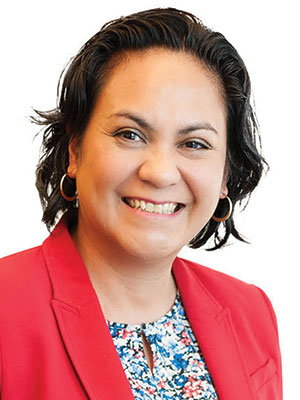Next month will mark one year from the end of my treatment. Is it normal to celebrate my “cancerversary”?

Christopher Recklitis, Senior Psychologist at Dana-Farber Cancer Institute in Boston. Photo courtesy of Christopher Recklitis
CHRISTOPHER RECKLITIS: The term “cancerversary” has become increasingly popular, especially on social media and the internet. Some think of it as the day you were first diagnosed with cancer, but others consider it to be the day you finished treatment or some other milestone.
People mark all kinds of anniversaries. We often think of marking positive occasions—birthdays and wedding anniversaries, for instance. Not many people have ways of marking challenging or difficult passages in their lives as well. So, I think the answer to the question “is it normal?” is simple: “Yes.” It’s normal to want to honor important points in our lives, and you may want to do that with your cancer experience as well.
When I talk with people about how they’ve marked their own experiences, the stories vary. Some people might have a party or go out with friends. For others, the recollection might be more bittersweet. Others still won’t want to think about it at all. Many will still be dealing with the consequences of their illness, whether it’s related to health, finances or other issues. It can be a time to take stock of the experience, but not everybody will feel like celebrating.
It’s OK to feel however you feel about it. If you want to go to dinner or have a party, that’s great. If you want to sit in a quiet place and think about how hard it was or cry a little, that’s fine too. I worry that some survivors see things on social media and think “I should do that,” even when it’s not a good fit for them personally. It’s OK to do it how you want to do it—not necessarily how others do it.
There’s a lot of emphasis on marking such occasions in a certain way that accentuates the positive. If you are having a positive experience as a cancer survivor, then feel free to celebrate. But the experience is not always positive, and we need to make room in our hearts and our conversations for people who aren’t having a great cancerversary too.
HONORING YOUR CANCERVERSARY // The National Coalition for Cancer Survivorship offers ideas for how to mark a cancerversary. // Cancer.net says one of the best ways to recognize a cancer milestone is to take ownership. // Fred Hutchinson Cancer Research Center highlights creative ways to honor a cancerversary, such as running a marathon or getting a tattoo.
As a person with cancer, do I need to give a full answer to the question “how are you?” every time someone asks me?

Mamta Kalidas, Oncologist in Houston, Texas, and Medical Editor for the American Cancer Society. Photo courtesy of the American Cancer Society
MAMTA KALIDAS: Answering the simple question “how are you?” can begin to feel exhausting. A simple “I’m fine” might feel insufficient. First of all, I’d like to point out that family, friends and co-workers should be mindful of their questions. That’s true even if it’s a simple “how are you?”
With that said, when such questions do come up, it’s perfectly fine to say what you really want to say. Maybe you’re not feeling so well that day. Perhaps you just aren’t in the mood to go through all the details. Remember that you set the rules about what you want to share and when you want to share it. In most cases, the people in your life are asking questions because they care and want to help. But they also need to understand that there will be days you won’t want to go into a lengthy explanation of what’s going on with your disease or in your life related to cancer.
There are some strategies that can help take the pressure off. Many people select a designated person, whether a family member or a close friend, to send out regular updates. Those messages might go out every few days or whenever things change. It can be helpful to have a go-to person instead of leaving the burden on you to keep others updated. If you are active online, then websites or social media offer other ways you might keep people in your life updated without feeling the need to constantly answer questions.
Of course, you don’t want to let a simple “how are you?” upset you. But, it’s also important to realize that there may be days when you are upset. That’s a normal part of experiencing cancer, too. Be honest with yourself and with the other people in your life.
In our society, we’re so used to being polite. It can feel rude if we don’t answer someone’s question. But it’s OK to say as politely as possible that you simply don’t want to answer the question. Or perhaps you’d prefer to fill them in some other time.
TALKING ABOUT YOUR CANCER // The American Cancer Society recommends thinking ahead of time about topics that are too sensitive to talk about yet. // The Gathering Place offers tips on how to keep friends and family informed. // MyLifeLine makes it easy to keep friends updated.
My friend just told me she is stopping treatment. How can I support her going forward?

Liwanag Ojala, Chief Executive Officer of CaringBridge. Photo courtesy of CaringBridge
LIWANAG OJALA: The number one thing to do to support your friend is to respect her decision as she reaches the end of her journey through treatment. She will have thought long and hard along with her health care team about the choice to stop treatment. She is the only one who can make that decision.
While you have every right to feel whatever way you do about it, not all things need to be vocalized. If you disagree with her choice, it could change the relationship for the worse if you say so, and that’s something you don’t want to do.
Depending on your friend’s personality and the nature of the relationship, it can also help to try to understand where her decision is rooted. It might help your friend to explain. Understanding the “why” can make the decision easier to accept. It sounds so simple, but that really is the heart of it.
Remember that your friend is the same person you’ve known. This choice doesn’t make her a different person. Sometimes I find that people forget that.
Rather than waiting on your friend to ask for help, dig deep. Pay close attention and jump in to do whatever it is you think your friend needs, without being intrusive, of course. Often, people facing a terminal illness are not in the mode of wanting to ask for help. But they generally do appreciate when help is provided. If you aren’t sure, ask a caregiver, as he or she may be in a better position to know what the needs are in that moment.
Sometimes, people feel alone when they hear a decision to end treatment has been made, but you are not alone. Your friend most likely has a community of people who care. Draw on that community for solace. Everyone in your friend’s life will be impacted by this decision. Rather than trying to figure out what to say or do on your own, ask how you might work together. Members of her support community also can rely on each other.
As your friend approaches the end of her life, remember that her caregivers are likely struggling to make sense of this difficult time as they walk alongside your friend. As you seek to support your friend, remember that her caregivers will need support as well.
AFTER TREATMENT STOPS // Choosing Wisely explains how to know it’s time to stop cancer treatment. // Memorial Sloan Kettering Cancer Center has advice on supporting a friend with cancer. // Medline Plus offers steps to take after treatment stops working.
Cancer Today magazine is free to cancer patients, survivors and caregivers who live in the U.S. Subscribe here to receive four issues per year.




